Rotating your tires can be very helpful in sustaining the tires’ condition. It is quite normal for newly rotated tires to cause weird vibrations and noise. Tire noise after rotation should go after 50 miles or so.
Tires can generate different types of noises based on the issue. It can be an alignment problem, a tire damage issue, or many others. But if the noise situation doesn’t appease even after 50-70 miles, there might be a severe issue with your vehicle.
Let’s see the reasons behind the noise after rotating the tire and how to fix it.
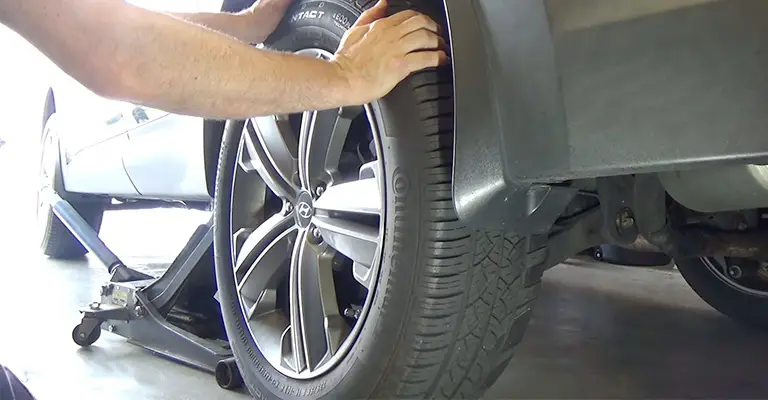
Reasons Why Your Tire Is Making Noise after Rotation
Rotating your tire can cause different types of weird noises. You might hear mild squeaking or may become the victim of a loud helicopter-like sound. Whether it’s small or loud, if it continues, you should never sidestep it.
A lot of people think of slight noises after tire rotation as inconsequential. But a small issue can gradually grow into something extremely detrimental if ignored for a long period.
The following points will indicate some reasons which cause tires to make noise after rotation.
Uneven Wear Pattern on Tires
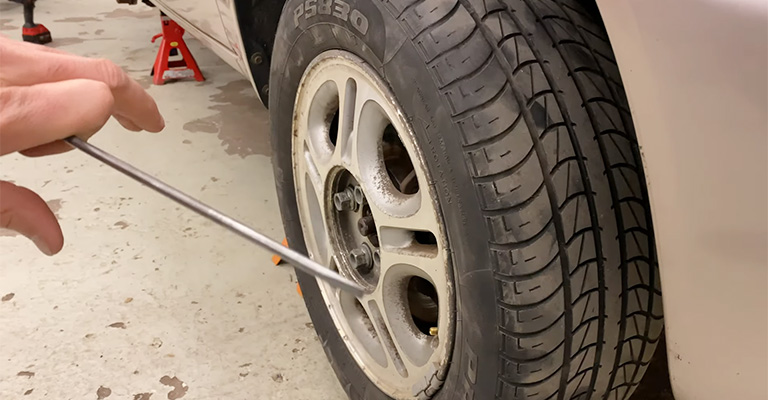
The main purpose of tire rotation is to make sure that the tires wear out evenly. This rotation process increases the longevity of your vehicle’s tires.
However, after rotating, the uneven wear patterns of tires can cause noises of various magnitudes, primarily mild humming noise. And the noise should quiet down after 50 miles as the wear patterns start to get adjusted.
Uneven patterns can cause loud noises sometimes. If the loud noise quiets down around 50 miles of driving, there is nothing to worry about.
Tire Alignment Issue
If your tire is making a loud and annoying humming noise after rotation, there might be an alignment issue that needs work here. The noise can be quite loud, and some people often describe it as the sound of a small helicopter.
Just imagining it is enough to ruin your mood. It is normal for tires to wear out unevenly. If they were not properly aligned when set up, the wearing could be even more incongruous.
This gravely uneven wearing not only causes extremely loud noise from the air chamber but also makes the ride bumpier and uncomfortable.
Messing Up the Orientation of a Directional Tire
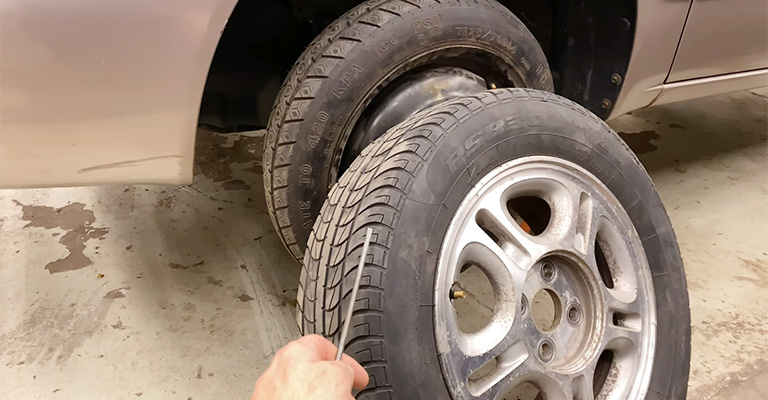
Directional tires are designed to rotate specifically in one direction. Their patterns make them extremely adaptive to icy and wet conditions, where normal tires will struggle gravely.
It’s hard to make mistakes with directional tires as the direction is marked with a prominent arrow sign. Since the pattern is designed to be one-directional, the wrong orientation will increase friction and create an unusual humming noise.
Old, Worn-out Tires
Tires can make unusual noise if it hasn’t been replaced in a long time. Rotating your tire is a good practice that can make your tires last longer. But it won’t magically make your old, worn-out tires functional.
After a certain period, you must replace your worn-out tires. Not only to avoid unusual noise and vibration but also to maintain safety.
Incorrect Rotation Process
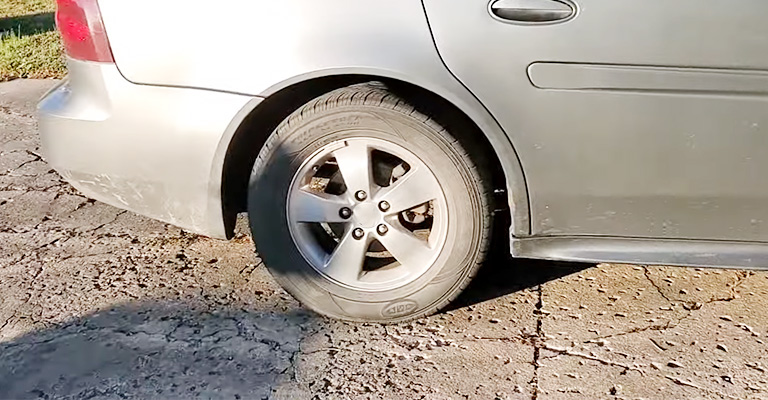
Rotating your vehicle’s tires simply doesn’t mean exchanging their place with each other. There is a specific process to it which depends a lot on the type and condition of your tires.
If your mechanic isn’t experienced enough, there is a chance he/she might mess up the rotation process. Applying a wrong rotation process can cause various sorts of unusual noises. It also damages your tires instead of preserving them.
Overtightened Wheel
Your tires can generate weird noises if the final lug on your wheel is excessively tightened. A too-tightened wheel makes the system stiff and makes the brake rotors unable to expand and contract properly as they heat up and cool down.
This causes the rotors to warp, and these warped rotors cause an excessive amount of noise.
Worn-out Wheel Bearing
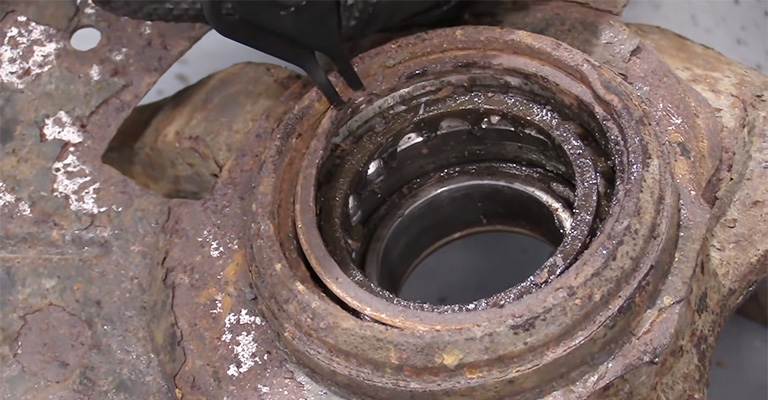
Sometimes tire noises herald a critical condition that requires immediate attention to it. Noise due to a bad or worn-out wheel bearing is such a portending one.
A damaged wheel bearing usually has nothing to do with rotating tires. But sometimes, it can worsen the already poor bearing condition unintentionally. A sort of purring or grinding noise will emit from a faulty bearing which should get your urgent attention.
Braking System and Suspension
Your vehicle’s braking system and suspension are directly related to your tire. So, if you’ve been noticing weird noises from your tires and rotating them couldn’t appease the noise situation, you should consult professionals about your suspension and braking systems.
Problems in suspension also create a loud humming or helicopter-like sound. Don’t ignore such noises because the situation will definitely worsen over time.
4 Ways to Fix Tire Noise after Rotation
Now that you’re aware of what sort of sounds you might face and the reasons behind them, let’s find out what you can do to solve these issues.
Replace Old Tires
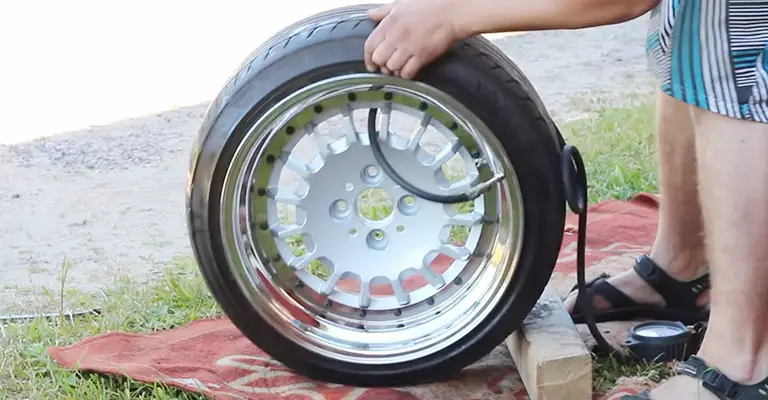
If the issue is with your tire and not some other parts, getting a brand-new set will always be effective.
Noise occurs mainly owing to uneven wear patterns in the tire treads. And there is no way to avoid that. Each wheel wears off its tire differently. The wearing becomes more aggressive and inconsistent if the tires are misaligned.
So, buying a new set of tires can give you a fresh start. When buying a new set, check if they’re directional or not. Only get directional tires if you have the necessity for them.
Maintain Schedule for Rotation, Balancing, and Alignment
Rotating, balancing, and checking the alignment of your tire requires a regular schedule. The more your tires will run in an inappropriate setting, the more damage and wearing it’ll face.
Many tire manufacturers agree that you should balance and align your tires every 5000 – 6000 miles. It’s also good practice to rotate your tires at regular intervals.
This will keep the wearing in check and greatly reduce the chances of creating annoying noises.
Choose Your Professionals Wisely
You must choose your mechanic wisely. The health of your tires will depend greatly on the procedures, and you want someone truly capable of maintaining your car.
Properly rotating, balancing, and aligning the tires will save you from queer and annoying sounds and ensure your safety. So, make sure you have a trusted place for these and any other sorts of vehicle servicing.
Check the Corresponding Parts Regularly
Keep an eye on your tires for an unusual wearing pattern. An old and worn-out tire is just as risky as it’s noisy.
Also, you shouldn’t use a tire ten years past its manufacturing date. So, make sure your tires are replaced when due. The legal tread limit for tires is 1.6 mm; look out for that as well.
Tire noise doesn’t only occur due to issues with tires. You should regularly check your suspension and braking system as well. This way, you’ll not only keep the annoying noise in check but also avoid major unwarranted accidents.
Use a torque wrench to tighten your wheel as needed. However, over-tightening the wheel will just cause unwarranted noise and issues.
Frequently Asked Questions
What is the cupping of tires?
Cupping is a condition where the tire tread blocks have worn out at 3-4 inches intervals. The tire will look like someone has scooped out parts of it with a cup. A cupped tire is seriously menacing and can occur due to a variety of suspension issues.
How often should you rotate your tires?
Rotating your tire should be scheduled based on your vehicle mileage. The normal rule of thumb is to rotate them every 5000 to 7500 miles. But this does not apply to all sorts of vehicles.
Final Thoughts
Tire noise after rotation is common, especially as you can’t avoid the uneven wearing of tires. But you can keep the wearing under control by recognizing the causes and implementing the apropos solutions.
We often take notice of the annoying loud tire noises and tend to ignore the mild squeaking and squealing. Remember, each noise indicates an issue of some sort, and these issues tend to aggravate. So, it’s always better to be safe than sorry.
Leave a Reply